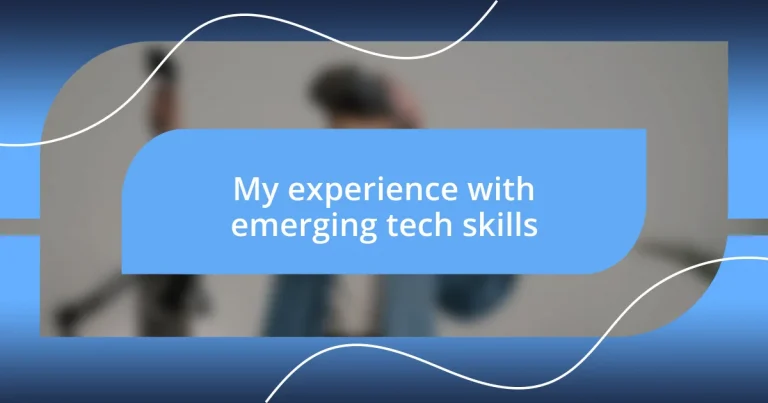Key takeaways:
- Embracing emerging tech skills, like AI and blockchain, enhances adaptability and fosters personal and professional growth.
- Practical applications of tech skills, such as automation and app development, highlight their potential to solve real-world problems and create community impact.
- Challenges in learning tech skills include navigating vast resources and keeping up with rapid advancements, but pursuing small victories can make the journey manageable.
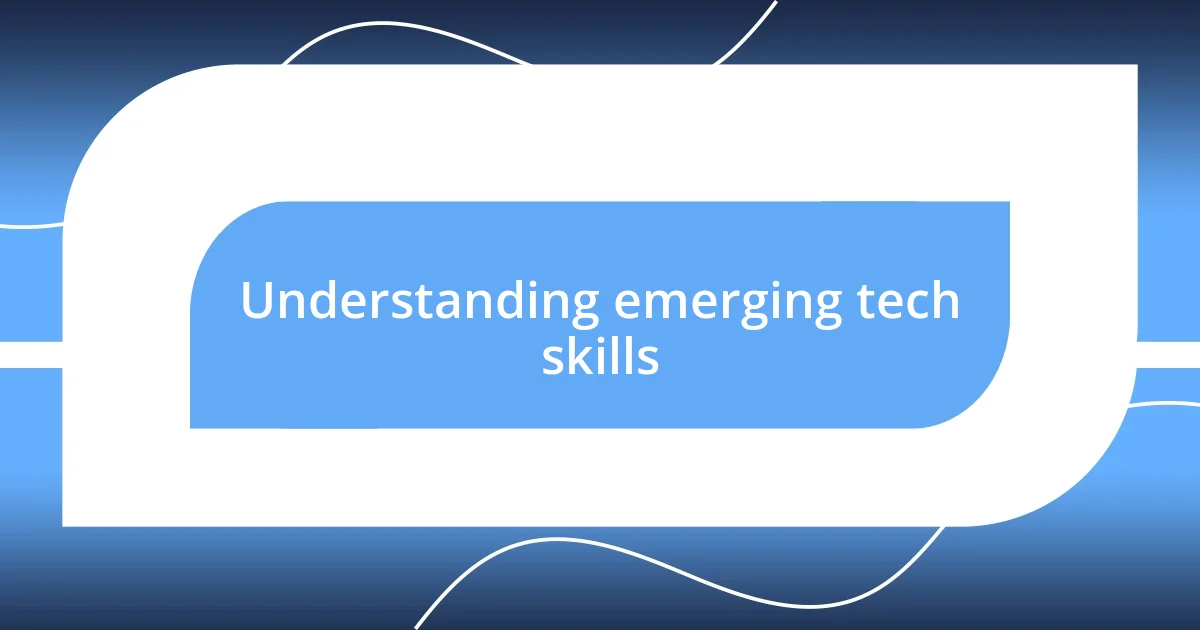
Understanding emerging tech skills
Emerging tech skills are pivotal in today’s rapidly changing job landscape, and they go far beyond just understanding new tools or software. When I first encountered concepts like artificial intelligence and data analytics, I felt a mix of excitement and intimidation. It made me wonder: how can someone keep up with such fast-paced evolution in technology?
One of the most fascinating aspects of emerging tech skills is their transformative impact on industries I thought I knew well. For instance, when I started learning about blockchain technology, I couldn’t help but think of the countless ways it revolutionizes transparency and trust across sectors. It was both thrilling and daunting to realize how adaptable we must be to harness these innovations effectively.
I remember a moment when I applied these emerging skills in a project. It was exhilarating yet nerve-wracking to integrate machine learning algorithms into my workflow. I often ask myself: what would have happened if I hadn’t stepped out of my comfort zone? Reflecting on those experiences, I see that embracing emerging tech skills doesn’t just prepare us for future challenges—it fuels our personal and professional growth.
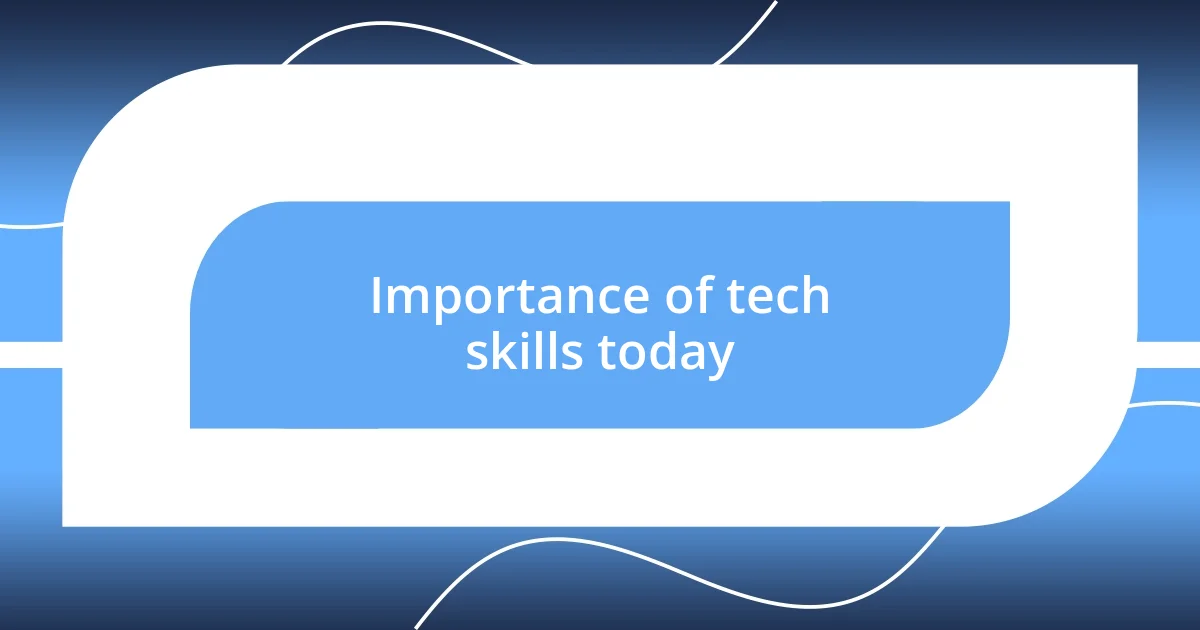
Importance of tech skills today
Tech skills are more important than ever, as industries continue to rely on technology for everything from efficiency to innovation. I recall attending a workshop where an expert emphasized that tech skills are not just desirable but essential for career advancement. It struck me how much these skills can set someone apart in a crowded job market—especially now, where employers constantly seek candidates who can demonstrate adaptability and critical thinking through technology.
In today’s world, the ability to understand and utilize technology fosters a competitive edge. For instance, I distinctly remember when I first dabbled in programming; it felt like unlocking a whole new way of thinking. Every line of code I wrote was a tiny victory, showcasing that even a basic understanding of tech can empower us to bring ideas to life. This journey taught me that, regardless of our current roles, incorporating tech skills can transform how we approach problems and innovate solutions.
Moreover, tech skills open doors to collaboration and creativity. I often find myself working on multidisciplinary teams where my ability to use digital tools enhances communication and project outcomes. This experience not only makes work more enjoyable but also highlights a vital truth: technology helps bridge gaps between different fields, creating a fertile ground for fresh ideas and breakthroughs.
| Importance of Tech Skills | Impact on Career |
|---|---|
| Foundation for Adaptability | Essential for Job Security |
| Enhances Collaboration | Encourages Innovation |
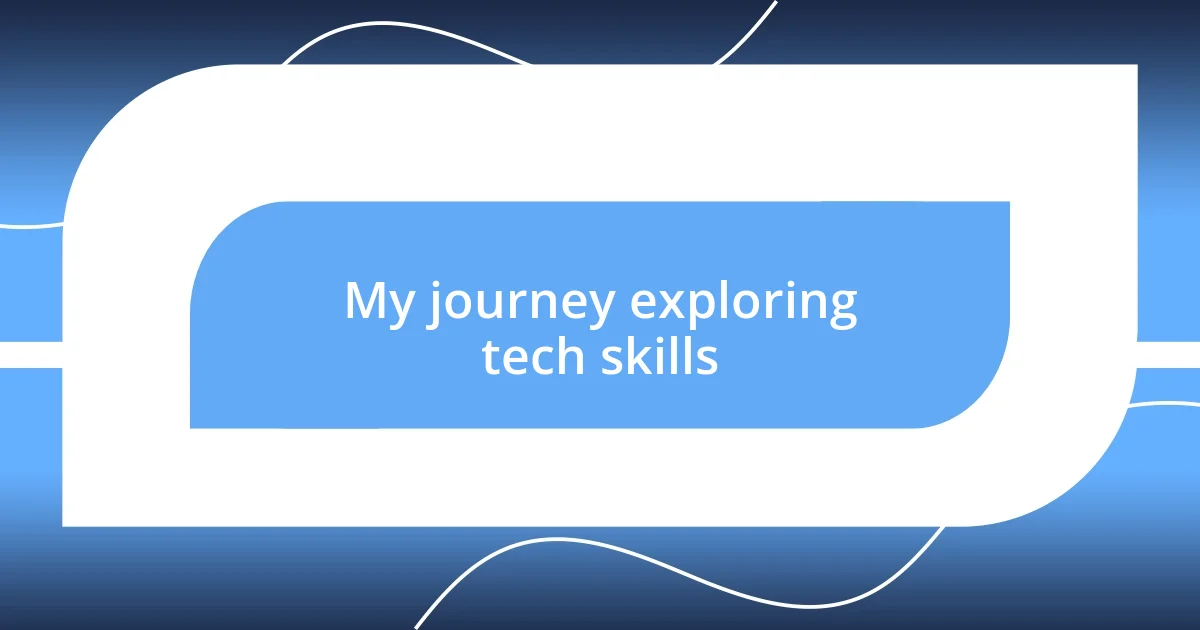
My journey exploring tech skills
When I look back at my journey exploring tech skills, I remember the thrill of discovery. Each new concept felt like a puzzle piece coming together, especially when I started diving into web development. I was astonished by how lines of code could create stunning websites. I never thought I could turn abstract ideas into something tangible and functional.
- The moment I built my first website, the rush of accomplishment was indescribable.
- I felt a wave of nervousness at first, hesitant about breaking things, but curiosity took over.
- As I learned more about responsive design, my enthusiasm grew—I realized I could reach people across various devices.
Over time, my comfort grew, but learning these skills also came with challenges. I recall late nights troubleshooting code, my emotions swinging between frustration and jubilation. Each breakthrough served as a reminder of the resilience I developed. That emotional rollercoaster taught me the power of persistence and ignited a passion for continuous learning in technology.
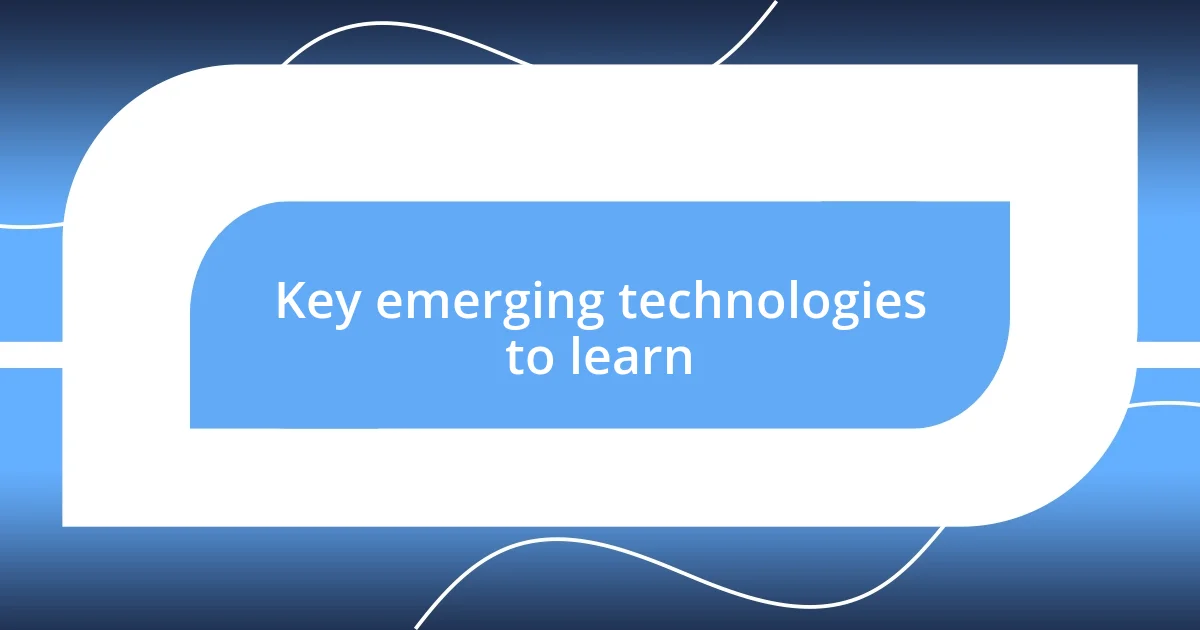
Key emerging technologies to learn
Emerging technologies are reshaping industries, and I believe focusing on areas like artificial intelligence (AI) and machine learning is vital. I remember the first time I experimented with AI algorithms during a hackathon. It was enlightening to witness how a machine could learn from data, mimicking human-like decision-making. Isn’t it fascinating how these technologies can streamline processes and enhance efficiency in ways we couldn’t have imagined a decade ago?
Another technology that stands out to me is blockchain. Its potential goes beyond cryptocurrencies; it’s transforming how we establish trust in various sectors. I distinctly recall a project where we assessed blockchain for supply chain transparency. The idea that we could track every step of a product’s journey, ensuring authenticity and ethical sourcing, really fired me up. Can you envision the impact this could have on industries from agriculture to textiles?
Lastly, don’t overlook the importance of cloud computing. My experience working with cloud platforms taught me the beauty of scalability and flexibility. I remember migrating an entire project to the cloud; it was a mix of anxiety and thrill. The ability to access resources anytime, anywhere empowers collaboration and innovation, which is essential in today’s remote work environment. How incredible is it that we can leverage powerful tools without requiring extensive hardware?
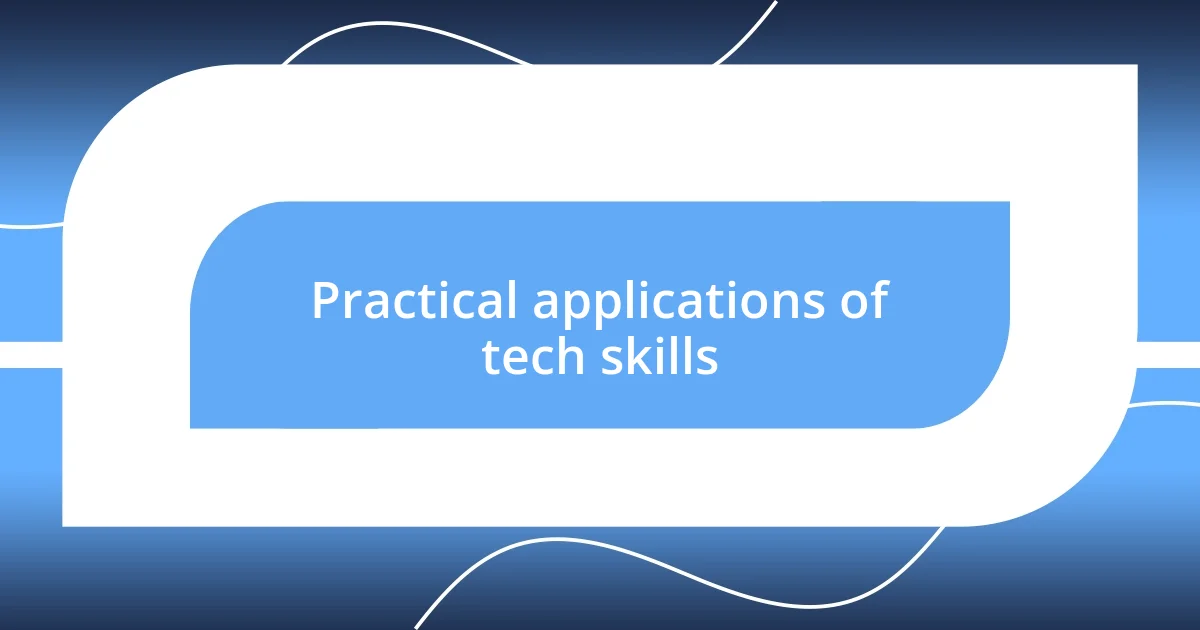
Practical applications of tech skills
Understanding practical applications of tech skills is crucial for any aspiring tech enthusiast. One memorable experience was when I was tasked with automating a repetitive reporting process at work using Python. The initial challenge felt overwhelming, but as I mapped out the steps, I found a rhythm. The satisfaction of seeing that automation save hours each week was electrifying. It truly reaffirmed my belief in the power of coding to solve real-world problems.
Another engaging application was when I collaborated with a team to develop a mobile app for a local charity. We had different tech backgrounds, which made brainstorming sessions incredibly dynamic. I vividly remember the moment we finalized the app’s user interface; it felt like we were shaping a digital extension of the charity’s mission. Seeing actual users interact with our app was immensely rewarding and highlighted how tech skills can create a genuine impact in our communities.
Then there’s cybersecurity, an area I dipped my toes into during a workshop. Learning about ethical hacking opened my eyes to the importance of internet safety and protecting sensitive information. I recall the adrenaline rush when I successfully identified and patched a vulnerability in a simulated environment. It struck me that these skills are not only about tech—you’re also playing a vital role in keeping people’s digital lives secure. Isn’t it remarkable how tech skills can contribute to both innovation and safety in our increasingly connected world?
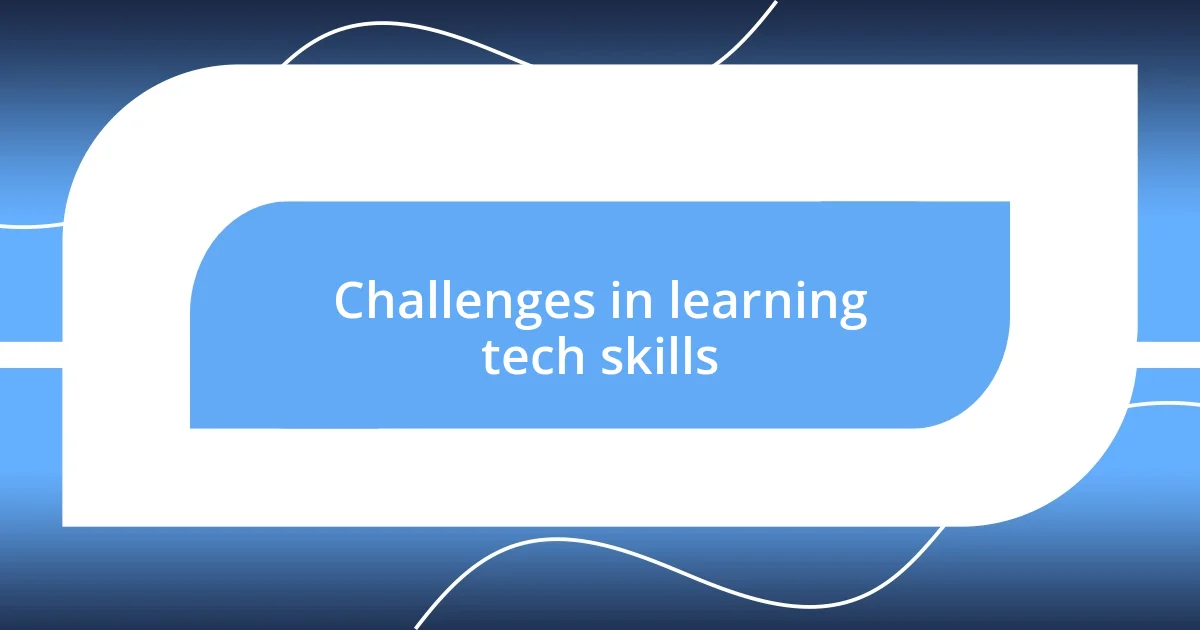
Challenges in learning tech skills
Learning tech skills can feel like navigating a maze with no clear exit. I still remember the frustration I experienced when I first tackled machine learning concepts. The sheer volume of jargon and the intricacies of algorithms often left me feeling overwhelmed. How do you sift through countless tutorials and resources without getting lost? It took a lot of trial and error for me to find the right materials that genuinely resonated with my learning style.
Another significant challenge is keeping up with the rapid pace of technological advancements. There’s an exhilarating energy in the tech world, but it can also be exhausting. The moment I grasped a new programming language, it seemed like another one was already trending. I found myself questioning whether I’d ever catch up. Does anyone else feel that constant pressure to stay ahead? I’ve come to accept that learning is a journey, not a race, and embracing small victories makes the process more manageable.
Additionally, the practical application of what I learned often posed its own set of hurdles. I vividly remember experimenting with a new cloud service, only to realize I lacked a concrete project to apply my skills. That gap made me feel a little aimless. How do you bridge the gap between theory and practice? I discovered that seeking out real-world projects or collaborating with others not only clarified my understanding, but also ignited a sense of purpose and excitement in my tech journey.












